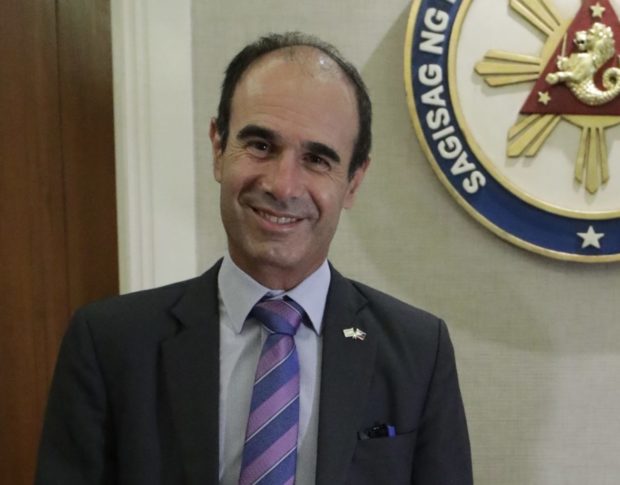
Ambassador of Israel to the Philippines Ilan Fluss —Photo by Jay Ganzon
A high-level delegation from the Israeli Ministry of Defense will visit the country in November to explore further cooperation in the Armed Forces of the Philippines’ modernization program, Jerusalem’s Ambassador Ilan Fluss said on Wednesday.
Fluss told journalists in a forum in Quezon City that Israel intends to continue being an active participant in the country’s military modernization as outlined in Republic Act No. 10349 or the Revised AFP Modernization Act.
“This is the agenda and to understand what are the future technologies that will be needed here vis-a-vis Horizon 3 and then to see where we can integrate Israeli technology,” said Fluss, who was first assigned to Israel’s Manila embassy when the original modernization law was first enacted in the 1990s.
The revised modernization program is divided into three parts, called “Horizons.” The first was implemented from 2013 to 2017. The second from 2018 to 2022 and “Horizon 3” will last from 2023 to 2028. Israel has been involved in all parts.
“As you know, we have our issues in the Middle East that are different from the challenges here but our approach [in regional security] is very similar,” Fluss said.
“The Israeli approach [is] protecting the safety and the survival of Israel and, on the other hand, engaging or trying to engage with those that are open for engagement on our side,” he added.
Israel defense contractors, sometimes under government-to-government deals, have delivered a number of new equipment to the Philippines, including fast-interdiction patrol boats and long-range patrol planes.
State-controlled Israel Shipyards has delivered four fast-attack interdiction-missile vessels (Shaldag-class) to the Philippine Navy and is now part of the country’s Acero-class patrol gunboats. Five more are to be delivered over the next two years.
In July, the Israeli newspaper Haaretz reported that the defense contractor Elbit Systems won a $114-million contract to supply two long-range patrol planes to the Philippines. There has been no official confirmation of this deal.
Fluss said other Israeli defense mechanisms would also be discussed, but he did not mention details.
The country’s improved ties with Israel is not limited to defense contracts.
Last week, Philippine Ambassador to Israel Pedro Laylo Jr. reported that he met with Israeli Tourism Minister Haim Katz to discuss the surging people-to-people exchanges between the two countries.
Citing Department of Tourism data, Laylo said tourist arrivals from Israel increased from 9,711 for the whole of 2022 to 10,312 Israeli tourists from January to August this year alone.
And the surge is two-way, Laylo said, with the Israeli Ministry of Tourism reporting that 22,800 Filipinos have arrived in Israel from January to August, already exceeding the 22,500 total for the whole of 2022.
“Two-way tourism between the Philippines and Israel for this period is already at 33,112, beating last year’s total of 32,200,” Laylo said in a statement from Tel Aviv, where the country still maintains its embassy.
Laylo said there are talks of direct flights between Manila and Tel Aviv in 2024, but they are still subject to the results of chartered trial flights.

